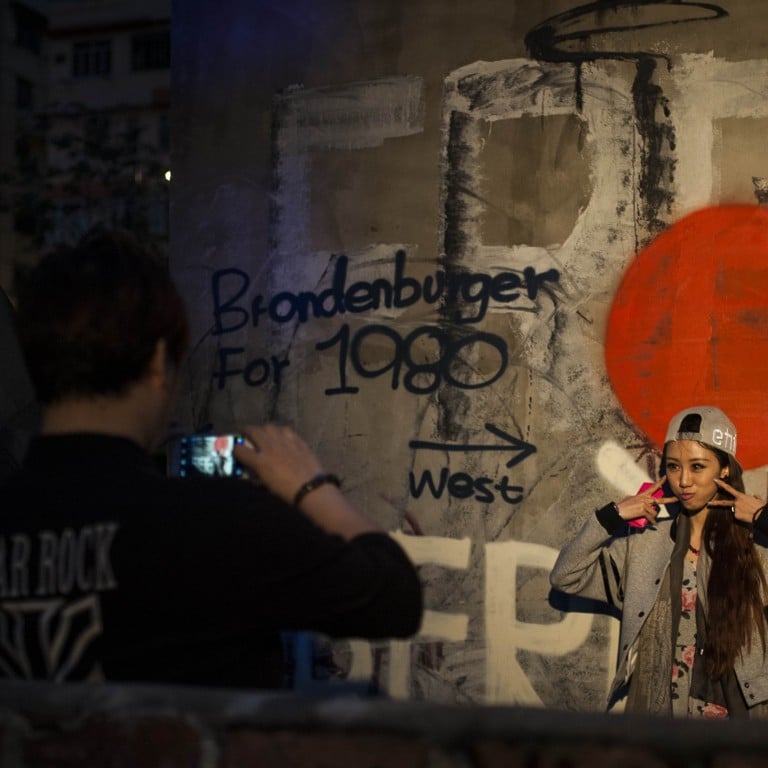
Let Berlin inspire world leaders to begin breaking down walls
Curtis Chin says the persistent and growing divide between rich and poor can be the first to go
From celebrations in united Germany marking the 25th anniversary of the Berlin Wall's fall to those in the United States over midterm elections delivering a more evenly divided Washington, what a week it has been for division, past and present.
The people of Hong Kong may well have looked at commemorations of Germany's unification with mixed feelings, given ongoing protests by students and others in the special administrative region over what some perceive as mainland China's heavy hand in Hong Kong affairs following the introduction of "one country, two systems".
How apropos it has been to watch the US midterm election returns from Berlin, the once divided capital of Germany.
And, indeed, perhaps this country that came back together against seemingly insurmountable odds might offer hope for a politically divided Washington or an East and Southeast Asia region increasingly worried about territorial issues in the South China Sea as well as cross-border environmental and migration challenges.
Just a few days after his party lost control of the US Senate in what has been termed a Republican wave sweeping aside numerous incumbent Democratic leaders at national, state and local levels, US President Barack Obama is now in Asia for summit meetings in China, Australia and Myanmar.
Unequal economic growth and sputtering efforts to strengthen cross-Pacific trade are all on the collective agenda of the Asia-Pacific Economic Cooperation summit, and the G20 and East Asia summits.
The US could well face two years of political gridlock under the watch of a weakened Democratic president and a US Congress now fully under the control of Republican leadership.
What that might mean to the so-called US pivot to Asia is still to be determined.
A divided Washington also might not bode well for those seeking greater cooperation between Beijing and Washington and strengthened international engagement by the US, as attention in that country understandably shifts to key domestic issues of concern to the American voting public.
However, the US electorate's support for efforts to increase the minimum wage paid to workers in some states, a policy position more often associated with Democrats, also suggests an opportunity for America, Asia and large parts of the world to come together on. That is, policy action to address a growing divide between the rich and poor.
According to a recent poll under the Pew Research Centre's Global Attitudes Survey, despite long-term optimism that exists in many nations, widespread concerns about inequality continue. Majorities in all 44 nations polled, including China, Japan, South Korea and Thailand in Asia, as well as Germany and the United States, say the gap between rich and poor is a big problem facing their country. Among these, majorities in 28 nations say this gap is a very big problem.
Asia as a whole has enjoyed tremendous growth in these past decades and has much to be proud of.
Some of this has been on show at the Asia-Pacific Economic Cooperation forum. The world should welcome Asia's rise, including China's economic success in lifting hundreds of millions out of poverty.
But also on show were the consequences of growth, often unequal, as the central authorities also took steps to remove cars and close factories in order to reduce the pollution that too often plagues China's capital city.
Underscoring Asia's unequal rise, Myanmar, this year's venue for the East Asia Summit, is a showcase for an economy gone wrong.
This past week, a united Germany celebrated the fall of the Berlin Wall, and many will marvel at the transformation of the one-time East Germany.
Others may well focus on the persistent divide between the haves and the have-nots.
Whether once separated by physical walls or split by existing political ones, today's leaders in Asia, the US and Europe - including newly elected members of the US Congress - should think about how much has been and can be accomplished when barriers come down, and engagement flourishes.
At commemorative ceremonies, German Chancellor Angela Merkel said that the fall of the Berlin Wall "showed us that dreams can come true and that nothing has to stay the way it is, no matter how high the hurdles might seem to be. It showed that we have the power to shape our destiny and make things better," she said, noting that people in Ukraine, Syria, Iraq and elsewhere around the world should feel heartened by the example of the wall's sudden demise. "It was a victory of freedom over bondage."
These are powerful words - and leaders around the world should take them to heart.

